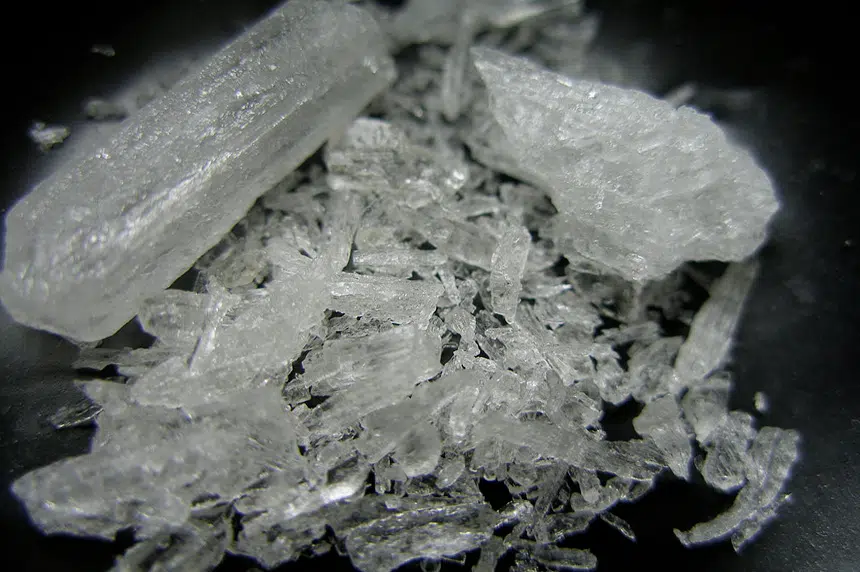It’s been a busy year on the methamphetamine front for Saskatoon police.
In a zoom-based press conference Thursday, Staff Sgt. Darren Pringle explained what his members are seeing on the streets.
“I can say in the last few years, we’ve seen an absolute explosion in the preponderance of methamphetamine use,” he said. “There’s an incredible drive to replicate that high and make that hurt go away.”
Pringle says this year to date, there have been 290 occurrences of methamphetamine trafficking or cases where the drug is involved, including possession. In the entire calendar year of 2019, police responded to 477 occurrences.
Pringle says Saskatoon is on pace to pass that total from 2019.
He also explained some of the differences between meth and other types of illicit drugs, namely cocaine.
“The high that you get from methamphetamine is more euphoric,” he said. “It’s a longer-lasting high, it’s a more intense high, and it’s a cheaper high.”
The going street price for a gram of meth sits at around $40 to $50 currently, compared to $80 to $100 for a gram of cocaine, according to Pringle.
This also poses challenges for police responding to meth-related incidents. Those include an increased risk depending on the amount of substance in that particular situation or the heightened risk of someone being on the drug and feeling its effects.
With an increase in supply, or drugs being moved, brings the heightened risk of guns, or ways people will protect the substance.
With more guns on the street, it creates that risk of accidental discharges, along with possible ripoffs at stash houses.
What the drug does to the human body, and the problems police face
During the zoom call, Pringle also spoke of the issues with responding to calls where people are on the drug.
“The unpredictability, I would say, is probably the most dangerous part for us because you have to approach everybody with a certain amount of emotional intelligence being used, and then to go from there,” he explained.
When approaching the suspects, police need to dictate if the suspect is struggling with a mental health challenge, or if that challenge stems from cognitive issues connected to the drug use.
“Over time, because the nature of the drug and how it erodes your (cognitive) ability, and your emotional stability over time. It really impairs your ability to connect with people, to relate to people. It sends you into a bit of psychosis and puts you in a paranoid state,” Pringle says.
He says the drug isn’t hard to produce. Whether it’s being created in a hotel room, at a home, in a mobile lab or the trunk of a car, it doesn’t have the same purity the drug was originally designed for.
“It was a drug built for (a) specific purpose. It’s now been turned and synthesized and released for recreational use. The unintended consequence of that… you’re dealing with people that don’t really feel pain,” Pringle said.
“They’ve got lots of energy, they may or may not be in a psychologically altered state. They have lower pain response… It takes a little more work to get these people into custody.”
With the COVID-19 pandemic creating restrictions on borders, another issue has been created with the supply and the ease of having less to do during the pandemic.
“As we have people more and more confined in their homes, people were using drugs that were potentially unfamiliar to them,” Pringle said. “People weren’t able to buy from the people they trusted.”
This did impact overdoses in Saskatoon as well, Pringle added.
Record numbers continue to roll out from Medavie Health Services West. Medavie’s Director of Public Affairs, Troy Davies, told 650 CKOM about the issue on Tuesday.
“We have never seen numbers like this. This is unheard of in our history of over 43 years that we have been serving Saskatoon and the surrounding community,” said Davies. “We hit record highs last week in overdose calls and responses to calls. There were 118 calls in responses, and 94 overdose calls.”
The meth “explosion” is something the community has been focusing on in the past few years, as the prevalence of the drug continues to grow.
More systems to help those suffering are being created, according to Pringle, along with a ‘drug court,’ to better handle those struggling with addictions, including methamphetamine.







